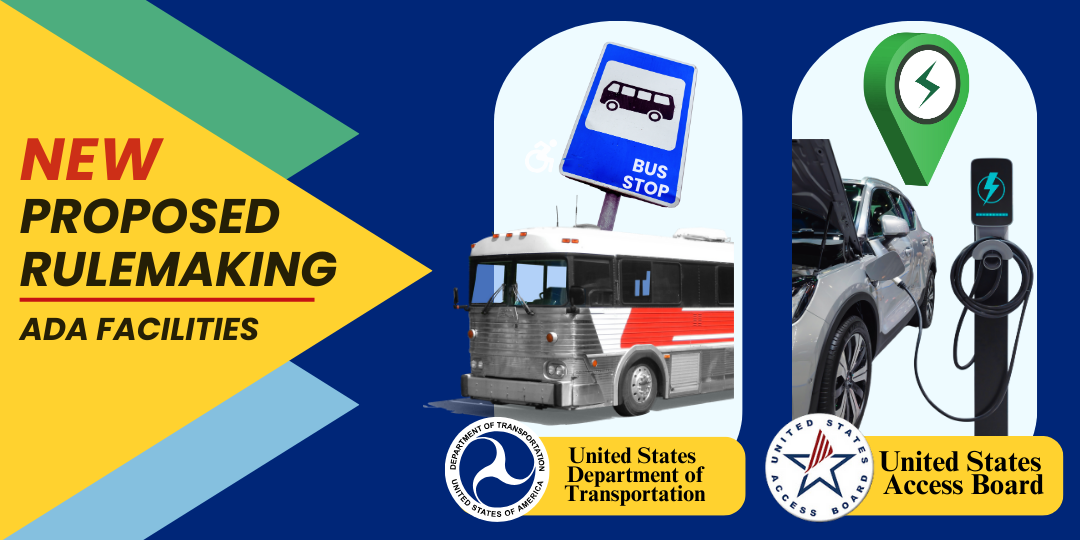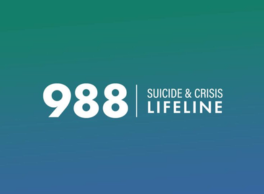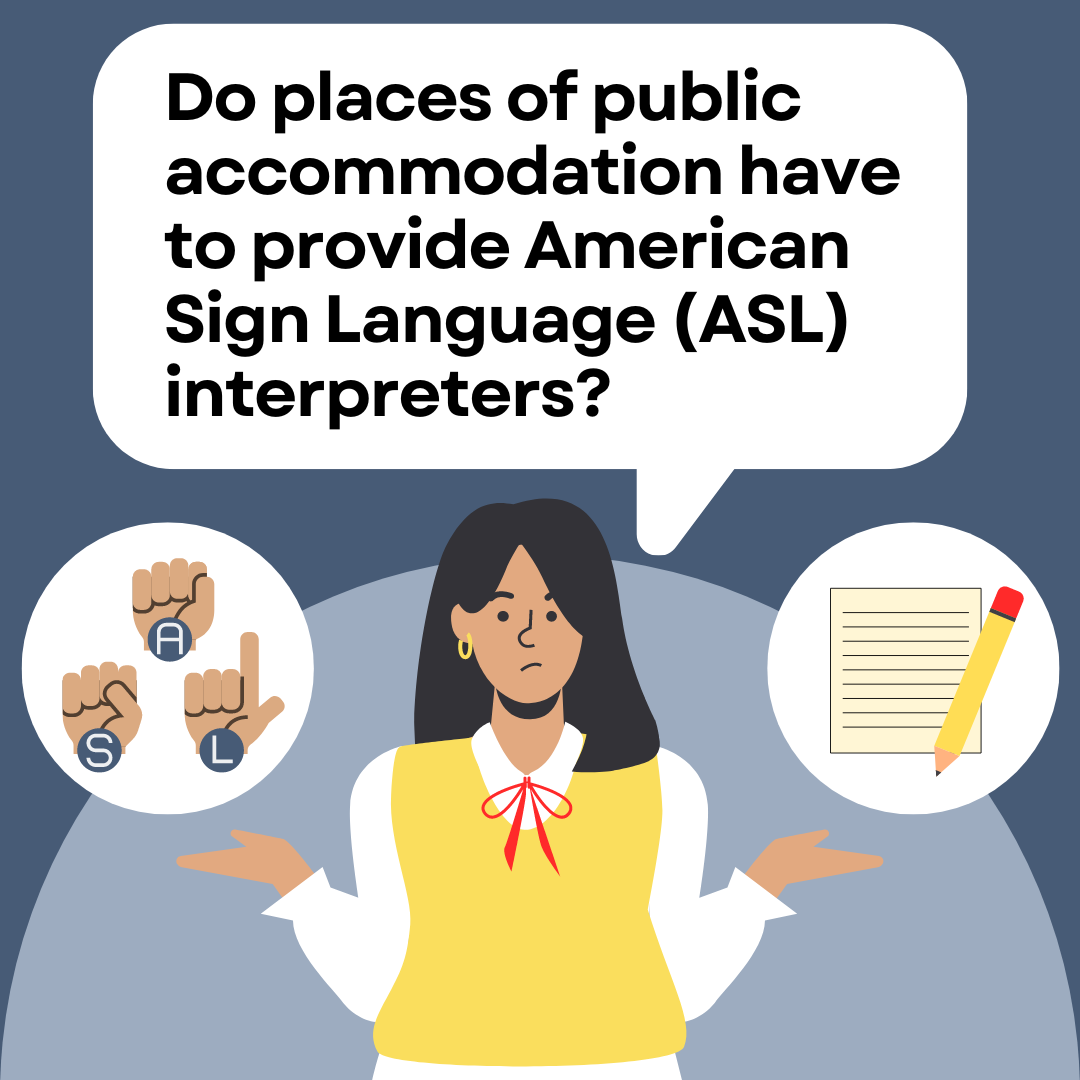

ADA Outreach and Barriers to Services for Spanish-Speaking Communities
Locked Out: Barriers to Accessible Technology Inside Prison Education Programs

The U.S. Department of Transportation (DOT) is proposing to adopt new rules for accessibility of transit stops in the public right-of-way. The proposal includes incorporating the Accessibility Guidelines for Pedestrian Facilities in the Public Right-of-Way (PROWAG) into the DOT's ADA regulations. These new standards would apply to new construction and alterations of transit stops covered under the ADA. Share your comments on the DOT proposal by September 23rd, 2024!
On September 3, the U.S. Access Board published a notice of proposed rulemaking (NPRM) to specifically address the accessibility of electric vehicle (EV) charging stations. This proposed rule provides specifications for the accessibility of EV charging stations, including proposed requirements for EV chargers, access aisles, and accessible routes. Public comments for the Access Board’s NPRM are due by November 4, 2024. Visit the U.S. Access Board’s EV Charging Stations webpage to learn more about the background of this proposed rule.

Here's Why Autistic Latinas Often Get a Late Diagnosis
According to this article, there are several reasons Latinas aren’t getting an autism diagnosis or are receiving a late diagnosis. Dr. Sandra León-Villa, an autistic Xicana psychologist, points to stereotypes as a contributing factor. In addition to educating people on accommodations and general information about autism, more representation of Latinas on the spectrum is needed.

988 Suicide & Crisis Lifeline Marks Second Year of Service in Nation
Since the launch of 988 in July 2022, counselors have answered more than 10 million calls, texts, and chats from people looking for help with suicidal thoughts and mental health and substance use-related crises. 2 million of these were answered via the Veterans Crisis Line. Learn more about how 988 has continued to expand its services and incorporate geo-routing technology to improve cellphone service for calls and texts.

$251 Million Awarded To Prepare People with Disabilities for Good Jobs
Under the Disability Innovation Fund (DIF) program, five-year grants have been awarded to two dozen higher education institutions with the goal of ensuring people with disabilities have access to good-paying jobs in the 21st century. The focus is on preparing individuals for competitive, integrated employment and enabling youth and adults with disabilities to be paid good wages while working in some of today’s most in-demand fields.

New Clinic and Training Program Aim to Improve Care for People with Disabilities
A new UI Health clinic called the Lifespan Disability Clinic is designed to create welcoming spaces and lead to better health outcomes for patients with disabilities. At the clinic, patients with disabilities can access a wide range of practitioners under one roof. With the help of a $2 million five-year grant, the clinic will also bring medical students into the clinic for training on caring for patients with disabilities.
Massey’s Death Underscores State Delay in Launching Mental Health Response Program
The state Community Emergency Services and Support Act (CESSA) requires that mental and behavioral health calls made to 911 be handled by mental health professionals, rather than police. The law was supposed to go into effect on July 1, 2022 – two years before a woman having a mental health crisis named Sonya Massey was shot by a Sangamon County Sheriff’s Deputy. The struggle to implement CESSA has caused lawmakers to push back its effective date twice. Getting CESSA up and running has also been complicated by the multiple agencies involved.

Federal Judge Rules FSSA Must Provide Modified Relief for Families
During a court hearing in August, the American Civil Liberties Union of Indiana argued on behalf of the Indiana Protection and Advocacy Services Commission and two medically frail children that families needed more services than what the SFC program provides. Recently, the federal judge presiding over the attendant care lawsuit ruled that FSSA must arrange for families to receive in-home skilled nursing services on top of the SFA program.
‘Train 4 Life’ Program Offered to People with Intellectual Disabilities
‘Train 4 Life’ is a free Special Olympics wellness initiative that focuses on strength-building and holistic health habits for individuals with intellectual disabilities. ‘Train 4 Life’ offers a 12-week plan focused on fitness, nutrition, and mental health to Special Olympics athletes ages 13 and older. Learn more about adaptive exercise by checking out the Great Lakes ADA Center’s Art-n-Rec archived webinar on Adaptive Strength and Endurance.

Michigan Accuses OCR Of ‘Legal Gymnastics’ in Section 504 Proceeding
The Michigan Department of Education (MDE) remains steadfast that the U.S. Department of Education’s Office for Civil Rights (OCR) has no jurisdiction to hold the state accountable for alleged pandemic-era civil rights violations against students with disabilities. According to the article, OCR found that the state harmed students with disabilities by sending incorrect guidance to school districts about make-up services for instructional time lost during pandemic school closures. In a recent brief, the state faults OCR for relying on “dated and unpersuasive precedent” to make its case.
Promoting Health Equity for People with Disabilities and their Families
Cold and flu season is on its way and Michigan is preparing to fight it by offering mobile health clinics to seniors and people with disabilities who face barriers to accessing office-based care. Disability Rights Michigan and Autism Alliance of Michigan have also created the MVP (Most Valuable Provider) certification as a model to advance health equity for people with disabilities.

MN Department of Human Services (MDHS) Investigating 15 Autism Service Providers
The state of Minnesota is investigating 15 autism providers for Medicaid-fraud. DHS administers Minnesota’s version of Medicaid, known as Medical Assistance, which is a federal-state health plan for poor and disabled people. DHS has already withheld payments due to credible fraud allegations under previous investigations. The FBI is also investigating possible fraud in Minnesota’s autism services program, which has exploded in growth since launching in mid-2015.
Research Uncovers Possible Link to COVID-19-Related Brain Fog
The study lead, Maxim Cheeran, says “We now know that viral infection in the lungs can cause inflammatory changes in the brain, affected by the age and sex of the patient. With this model, we can … start development on targeted treatments to mitigate the impact of COVID-19 on the brain.” These findings also allow for more accurate vaccine development. The research team has another study underway that could shed light on the persistence of these symptoms in individuals experiencing long COVID, including the long-term impacts on neurocognitive behavior and memory loss.

Federal Judge Tosses Ohio Voting Restrictions on Voters with Disabilities
A federal judge has struck down part of Ohio’s sweeping 2023 election law, which voting rights groups say restricts people from helping voters with disabilities cast absentee ballots. Voting advocates argued that the law went too far by prohibiting anyone but a few qualifying family members from helping people with disabilities deliver their ballots, excluding potential helpers such as professional caregivers, roommates, in-laws, and grandchildren.
Disability Rights Ohio (DRO) Free Education Legal Clinic Series
DRO has partnered with organizations to provide a Free Education Legal Clinic series for parents and guardians of children with disabilities including virtual workshops. Individuals can also schedule one-on-one guidance sessions with attorneys to receive more personalized assistance. Recordings of previous DRO workshops are available free on demand.

Wisconsin Voting Access Ruling and Complaint on Behalf of People with Disabilities
A Wisconsin judge refuses to pause absentee voting ruling sought by disabled people, saying putting his ruling on hold “would inflict significant harm on both the disability rights advocates and the public interest.” It will now be up to the state appeals court to decide whether to pause the ruling that opens up a new way for an unknown number of disabled voters to cast their ballots before the November 5th election. The town of Thornapple could face legal action from the Department of Justice for its refusal to offer voters with disabilities electronic voting machines instead of paper ballots. According to a complaint with the Wisconsin Elections Commission against the Town of Thornapple, the town did not offer a different accessible voting system when it decided to remove electronic voting equipment from their polling place.
Task Force on The Healthcare Workforce Issues Recommendations in Its Final Report
The Governor’s Task Force issued its final report and is calling for efforts to reduce barriers to training, expand Medicaid, boost incentives for those working in underserved areas, and more. The report also calls for rate increases for home and community-based services to better help the state’s aging population and those with disabilities, as well as behavioral health services rate increases.
Important Note: News from third-parties may be subject to change or require a subscription to view. The Great Lakes ADA Center is not responsible for content restrictions or changes made by third-parties.

Eviction Prevention: A Toolkit for Tenants and Service Providers
This toolkit contains eviction prevention strategies, housing services and other information to support stable housing for people with mental health conditions, substance use disorders, and co-occurring disorders. These tools are geared towards community-based low-income housing providers and the service organizations supporting these individuals in their housing and recovery.

September is National Service Dog Month! To celebrate, we invite you to check out the ADA National Network’s (ADANN) resource hub containing information on all things service animal. You can also check out these Service Animal videos from our friends over at the Rocky Mountain ADA Center!

Blog: They’re Called Employee Work Areas, Not Employee Only Areas
Our Great Lakes ADA Center has released a new blog on the topic of “Employee Work Areas” and how these spaces are defined and covered under the ADA. Check out past blogs from the Great Lakes ADA Center.

Toolkit: Helping Workers with Disabilities Get Good Jobs
The Department of Labor (DOL) has shared a toolkit with strategies and best practices for recruiting, hiring, retaining and advancing workers with disabilities. This resource can be used by many employers but is primarily intended for public and private employers working to build equitable pathways to good jobs for people with disabilities in industries like construction, manufacturing and clean energy.

Answer: Places of public accommodation (businesses, non-profits, etc.) covered under Title III of the ADA are required to provide “effective communication” which can require auxiliary aids and services like an ASL interpreter.
Places of public accommodation have a duty to make sure their communication with people who have disabilities is as effective as it is with people who don’t have disabilities. The method used to provide effective communication will depend on a number of factors such as the person’s disability, their preferred method of communication, the nature of what is being communicated (e.g. how complex is the communication?), and the context in which the communication is taking place.
The ADA provides the following examples of auxiliary aids and services although this list is not exhaustive:
There is no one-size-fits all solution for providing effective communication as each person’s disability-related needs will be different. This is why places of public accommodation are encouraged to consult with the person about which aids or services will work for them. Whatever method is used, as long as the communication is effective, it meets the requirement.
Resource(s):
Learn more by visiting our ADA Frequently Asked Questions.

EEOC vs. VibraLife of Katy, LLC (VibraLife)
According to the lawsuit, VibraLife hired an employee with a sleep disorder for a night-shift position. The job posting required the selected candidate to work 36 hours per week via three 12-hour shifts. Upon beginning her employment, the employee was notified that she would be required to work an additional 12-hour shift every other week. The employee promptly requested an accommodation that her schedule be limited to the terms of the job posting. Shortly after receiving the employee’s request for a reasonable accommodation, the employee was demoted and subsequently terminated.
EEOC vs. Alto Ingredients, Inc. (Alto)
According to the lawsuit, when an electrician applied for a job at Alto, he told the company that he was disabled due to a back injury. The electrician passed Alto’s pre-hire physical and was hired. His employment was successful and free of accidents. Alto also praised him for his technical ability and troubleshooting skills. Nevertheless, after coworkers said they were worried that the electrician had difficulty with climbing stairs and ladders and might fall, Alto fired the electrician due to these alleged safety concerns.
EEOC vs. Innovative Services Northwest (ISNW)
The lawsuit alleged ISNW failed to accommodate a former employee who sought to return to work after medical treatment for a hip impairment. After the employee made multiple requests for a reasonable accommodation, including job modifications, ISNW deemed her too high-risk to employ unless her medical provider cleared her to return at 100% capacity. The employer forced her to take unpaid leave and later fired her. Under the three-year decree, ISNW will pay $136,500 and furnish other relief to settle the lawsuit.
EEOC vs. National Telecommuting Institute, Inc. (NTI)
The lawsuit alleged NTI, a staffing support firm, violated the ADA when it did not pursue job placement or referral for blind and low-vision job applicants as telephone-based customer service agents when the company became aware that the applicants used assistive technologies such as screen readers to convert computer text to speech. This was based on a presumption that the company’s client employers would not be able to support the assistive technology. The lawsuit also alleged that NTI denied disability-related accommodations during their pre-employment application process. Under the three-year decree, NTI will pay $1.25 million and furnish other relief to settle the lawsuit.
According to the lawsuit, a deaf applicant met the qualifications and applied for a job at one of Champion Media’s printing facilities. After participating in an initial conversation over the phone, the applicant was selected for an in-person interview. The applicant requested a sign language interpreter as an accommodation for the interview, and instead of providing an interpreter, Champion Media canceled the interview.
EEOC vs. Pilot Air Freight, LLC (Pilot)
According to the lawsuit, Thomas Hunt informed his manager that he needed to request leave to see his doctor about some biopsy results. About 10 days later, Hunt was terminated by Pilot, allegedly as a result of a reduction in force. Pilot claimed that Hunt was laid off because he had less tenure than other employees and his position was eliminated. However, in the months leading up to and following Hunt’s discharge, Pilot hired several employees who were not discharged based on tenure and hired an employee in a position very similar to the one that Hunt previously held, and with a higher salary. Under the one-year consent decree resolving the lawsuit, Pilot will pay $400,000 in monetary damages to Hunt and furnish other relief to settle the lawsuit.
EEOC vs. ABM Industry Groups (ABM)
According to the EEOC’s investigation, a deaf worker received a job offer from ABM. After the worker requested an accommodation, ABM engaged in discussions with Norcal Services for Deaf and Hard of Hearing regarding potential accommodations. However, the worker claims to have waited for several months without a start date or further follow-up communication. A settlement was reached which requires ABM to pay $52,000 and injunctive relief to the deaf worker, review its non-discrimination policies, and conduct manager and employee training at the relevant locations.
EEOC Filed a Trio of Lawsuits In Three Different Industries To Enforce The ADA
EEOC filed suit after first attempting to reach a pre-litigation settlement through its administrative conciliation process in each of these three cases:
According to the EEOC’s lawsuit, AG Equipment Company violated federal law when it fired 10 employees for failing to receive a COVID-19 vaccination because of either their religious beliefs or medical restrictions. The company refused to discuss the employees’ requests or explore possible accommodations, and fired the 10 individuals, along with 77 other unvaccinated workers.

The Justice Department has reached an agreement with the County of Los Angeles to resolve its lawsuit alleging that the county violated the Americans with Disabilities Act (ADA) by denying voters with disabilities an equal opportunity to participate in its voting programs, services, and activities when it failed to select and use facilities as polling places that are accessible to persons with disabilities.
DOJ v. Texas Juvenile Justice Department (TJJD)
The Justice Department announced its findings that TJJD is violating the U.S. Constitution by exposing children to excessive and prolonged isolation; failing to protect children from sexual abuse and providing adequate mental health services). DOJ states they are also violating the Individuals with Disabilities Education Act (IDEA) by failing to provide special education and related services to children with disabilities as well as the Americans with Disabilities Act (ADA) by not providing reasonable modification and denying children with disabilities an equal opportunity to benefit from education. Assistant Attorney General Kristen Clarke Delivers Remarks Announcing Findings in Statewide Civil Rights Investigation of the Texas Juvenile Justice Department.
DOJ vs. Lincoln Public Schools
The DOJ filed a complaint and proposed consent decree to resolve allegations that Lincoln Public Schools (LPS), in Lincoln, Nebraska, violated the ADA by denying some deaf and hard-of-hearing students an equal opportunity to attend their neighborhood schools or participate in the high school choice program.
DOJ v. Commonwealth of Kentucky
The DOJ has announced they have reasonable cause to show that the Commonwealth of Kentucky is violating the ADA by unnecessarily segregating adults with serious mental illness in psychiatric hospitals, rather than providing care in integrated community settings. The department’s investigation found that Kentucky fails to provide access to community-based mental health services such as: mobile crisis response, crisis stabilization and crisis respite, case management, Assertive Community Treatment, Permanent Supportive Housing, supported employment and peer support. Read the DOJ Findings Report from their Investigation of Kentucky’s Unnecessary Use of Psychiatric Hospitals to Serve Adults with Serious Mental Illness in Louisville.

DOJ v. Community Bank, N.A. (CBNA)
A settlement has been reached with Community Bank to resolve two allegations that customers at a CBNA branch were denied American Sign Language interpreters for complex banking services. Under the settlement, CBNA will furnish appropriate auxiliary aids and services, free of charge, when necessary to ensure effective communication with individuals with disabilities; provide timely responses to requests for auxiliary aids and services; and will not require an individual with a disability to bring another individual to interpret for him or her. CBNA will also train all customer-facing employees on an Effective Communications Policy and pay each complainant $1,000 as compensation for harm.
DOJ vs. WAIRE, LLC (ELLINGTON BEHAVIORAL HEALTH)
Ellington Behavioral health has entered into a settlement agreement in response to a complaint alleging the medical practice did not provide an individual with an ASL interpreter for several mental health counseling appointments, which the DOJ confirmed through its investigation. Ellington Behavioral Health has agreed not to provide auxiliary aids and services to ensure effective communication with its patients and their companions who have disabilities. The medical practice has also agreed to provide reasonable modifications to policies and procedures for individuals with disabilities and will pay $5,000 to compensate the complainant.
DOJ vs. The Emily Program P.C. (TEP)
An eating disorder clinic (TEP) and the DOJ have entered into a voluntary settlement agreement in response to an investigation of a complaint by a person with a disability alleging discriminatory treatment. Under the terms of the settlement, the clinic is making several changes including adding staff training; appointing a specific ADA Dietary Designee at each clinic; and logging requests for dietary modifications. The former client who brought the matter to the attention of the DOJ has been offered $15,000 by The Emily Program.

